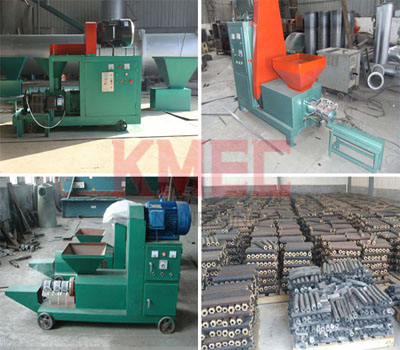Can briquettes replace coal?
In recent years, with the increasing global concern about environmental protection and sustainable development, it has become an important topic to find energy sources to replace traditional coal. In this context, briquettes (compressed biomass fuel), as the representative of clean energy, have gradually attracted people’s attention. Briquettes are pressed by biomass briquetting machine, which have many advantages. So, can briquettes replace coal and become the main choice of energy in the future?

First of all, from the perspective of environmental protection, briquettes have obvious advantages. Coal combustion will release a lot of carbon dioxide, sulfide and other harmful substances, which will have a serious impact on the environment and air quality. Briquettes are mainly compressed from agricultural wastes, sawdust, rice husk and other biomass raw materials, and their carbon emissions during combustion are relatively low, and they contain almost no sulfide and heavy metals. Therefore, briquettes are considered as a cleaner and more environmentally friendly fuel.
Secondly, from the perspective of resource utilization, briquettes are also sustainable. Coal is a non-renewable resource, and its exploitation has caused great damage to the natural environment. The raw materials needed for briquettes are mostly agricultural and forestry wastes, which can not only reduce the pressure of waste accumulation on the environment, but also realize the recycling of resources. Converting these wastes into fuel by biomass briquetting machine not only improves the utilization rate of resources, but also provides new opportunities for rural economic development.
However, there are still some challenges to completely replace coal with briquettes. The first is technology and cost. Although the production technology of briquettes is relatively mature, its large-scale promotion still needs to invest a lot of money and technical support. In addition, the calorific value of briquettes is usually lower than that of traditional coal, which may affect their wide application in industrial fields. Second, the storage and transportation of briquettes also need certain conditions, such as moisture-proof measures, which may bring difficulties in some areas.
Generally speaking, as a kind of clean energy, briquettes have obvious advantages in environmental protection and resource utilization, but briquettes still need to overcome obstacles in technology, cost and popularization to completely replace coal. In the future, with the progress of technology and the support of policies, briquettes are expected to play a more important role in the energy structure and contribute to the realization of green development. If you need to produce biomass briquettes, you might as well take a look at our biomass briquetting machine.

